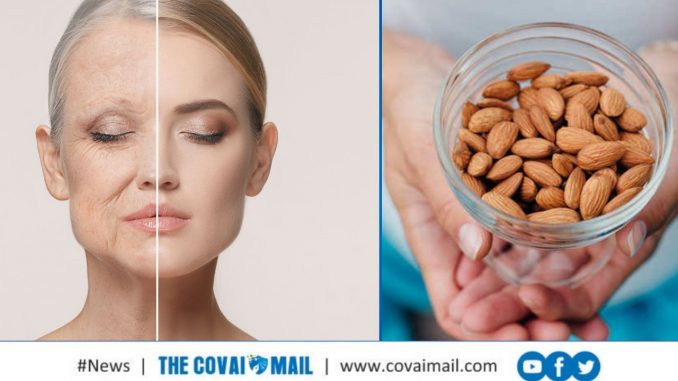

A new pilot study by researchers at the University of California, Davis found that a daily snack of almonds in place of other nut-free snacks improved measures of wrinkle width and severity in postmenopausal women. The study was funded by the Almond Board of California and is the first of its kind to examine almonds’ effects on skin health. Raja Sivamani, MD MS AP, integrative dermatologist and lead researcher.
A press release detailed on the study and results. It stated 28 healthy, postmenopausal women with Fitzpatrick skin type 1 (always burns, never tans) or 2 (usually burns, tans minimally) were randomly assigned to either an intervention or a control group. Almonds were provided as 20% of total daily calorie intake for the intervention group (340 calories/day on average), about 60 grams.
The control group consumed a calorie-matched nut-free snack in place of almonds daily: cereal bar, energy bar or pretzels. All participants were advised not to consume any nuts or nut-containing products over the course of the study (except for the almond snack for the intervention group). They otherwise were advised to continue their usual daily energy intake.
After a four-week dietary wash-out period, participants were randomized to one of the two study groups detailed above. Study visits occurred at baseline, 4 weeks, 8 weeks, 12 weeks and 16 weeks. Facial wrinkles were assessed using high-resolution facial photography and validated 3-D facial modeling and measurement at baseline, 8 weeks and 16 weeks. Skin barrier function was assessed by measurement of sebum production and transepidermal water loss (TEWL).
Photographic image analysis showed that the almond group had significant reductions in wrinkle width and severity, by 10 and 9%, respectively, compared to the control group at the 16-week time point.
There were no significant differences in sebum production between groups after 8 and 16 weeks. There were no significant differences between groups in transepidermal water loss (TEWL) from baseline after 8 and 16 weeks. There were no significant changes from baseline in the skin barrier function (P=0.65) between the almond and control groups relative to baseline after 16 weeks.
Results of this pilot study suggest that daily consumption of almonds may play a role in reducing wrinkle severity in post-menopausal women. The outcomes warrant future studies with expanded population groups and additional evaluations for signs of skin aging.
